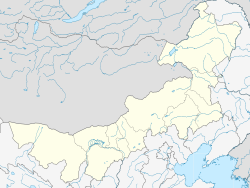Enhe
Enhe Russian Ethnic Township
恩和俄罗斯族民族乡 Эньхэ-Русская национальная волость ᠡᠩᠬᠡ ᠣᠷᠣᠰ ᠦᠨᠳᠦᠰᠦᠲᠡᠨ ᠦ ᠰᠢᠶᠠᠩ | |
|---|---|
| Coordinates: 50°49′08″N 119°54′40″E / 50.819°N 119.911°E / 50.819; 119.911 | |
| Country | China |
| Autonomous region | Inner Mongolia |
| Prefecture-level city | Hulunbuir |
| County-level city | Ergun City |
| Area | |
| • Total | 2,068 km2 (798 sq mi) |
| Population (2017) | |
| • Total | 2,339 |
| • Density | 1.1/km2 (2.9/sq mi) |
Enhe Russian Ethnic Township (Russian: Эньхэ-Русская национальная волость, simplified Chinese: 恩和俄罗斯民族乡; traditional Chinese: 恩和俄羅斯民族鄉; pinyin: Ēnhé Èluósī Mínzú Xiāng) is an ethnic township in Northeast Inner Mongolia under the administration of Ergun City.[1][2] The township along the banks of the Argun River.[1] Enhe is the only ethnic township in China designated for China's Russian minority.[1] Enhe spans an area of 2,068 square kilometres (798 sq mi), and has a population of 2,339 people as of 2017.[2]
Geography
Enhe spans an area of 2,068 square kilometres (798 sq mi), with its center located 98 kilometres (61 mi) north of Ergun's urban center.[2] Enhe's terrain is largely hilly, with its elevation ranging from 700 metres (2,300 ft) to 1,000 metres (3,300 ft) above sea level.[2] The ethnic township shares a 75 kilometres (47 mi) border with Russia, determined by the Argun River.[2]
Flora and fauna
The ethnic township hosts much undisturbed nature, including large swathes of virgin forests and grasslands.[2] Plants native to Enhe include lingonberries, blueberries, Chinese skullcaps, and dangshen.[2] Animals native to Enhe include the Asian black bear, the Siberian roe deer, the lynx, and the Hazel grouse.[2]
Climate
Enhe experiences an average annual temperature between −5 °C (23 °F) and −4 °C (25 °F), with the lowest recorded temperature being −50 °C (−58 °F), and the highest recorded temperature being 39 °C (102 °F).[2] The ethnic township experiences an average annual precipitation between 450 millimetres (18 in) and 600 millimetres (24 in).[2] On average, Enhe experiences 90 frost-free days per year.[2]
Demographics
As of March 2017, Enhe's population totals 2,339,[2] and is largely Russian and descended from mixed marriages of Han Chinese and Russians.[1][2] A 2019 publication from the ethnic township's government states that 1,309 of Enhe's 2,339 people, or 55.96% of its total population, is either ethnically Russian or have both Russian and Chinese heritage,[2] whereas a 2021 publication from Ergun's municipal government suggests that 80% of Enhe's population have some Russian lineage.[1] Lonely Planet observes that some of the people in the township "look purely Russian".[3]
Records of marriages between Chinese and Russians in the region date back to the 1890s from the beginning of Russian colonization of Manchuria. Unlike the conventional colonial marriage pattern of Western men marrying native women, the predominant combination in Manchuria was between Russian women and Chinese men. Mixed families are mainly settled along the towns and villages of the Argun River including Enhe, which is the only one of the settlements to be an official ethnic Russian township.[4]
In addition to Russian and Han Chinese populations, Enhe is also home to significant Mongol, Hui, Manchu, Korean, Daur, Oroqen, and Evenk populations.[2]
Economy
Sizable mineral resources run through the region, including gold, lead, zinc, iron and copper.[2]
Enhe hosts one state-owned ranch and two state-owned tree farms.[2]
Education
There is one school: Ergun City Enhe Primary School (额尔古纳市恩和小学).[5]
Tourism
Enhe has emerged as a tourism destination noted for its peaceful countryside backdrop. Lonely Planet describes Enhe as "a charming village brimming with an unhurried and authentic atmosphere" where "herders milk their cows outside their properties when they aren't taking them out to pasture".[3] Tourism is also enhanced by the Russian cultural ties of the township including Russian bakeries and buildings with the architectural stylings of traditional Russian wooden cottages.[6] There is also homestay accommodation in Enhe giving a representation of traditional Russian village living.[7]
There were plans to enclose the village and charge an entrance fee,[7] though as of 2023 no such actions have been taken.
See also
- Shiwei, Inner Mongolia - Neighboring town
References
- ^ a b c d e 恩和俄罗斯民族乡 [Enhe Russian Ethnic Township]. eegn.gov.cn (in Chinese). Ergun Municipal Service Bureau. 2021-04-23. Archived from the original on 2021-07-14. Retrieved 2021-07-14.
- ^ a b c d e f g h i j k l m n o p q 恩和俄罗斯族民族乡 [Enhe Russian Ethnic Township]. xz.eegn.gov.cn (in Chinese). Enhe Russian Ethnic Township People's Government. 2019-01-30. Archived from the original on 2021-07-14. Retrieved 2021-07-14.
- ^ a b "Enhe". Lonely Planet.
- ^ Entangled Histories: The Transcultural Past of Northeast China (PDF). London: Springer. 2014. pp. 47–58.
- ^ "义务教育学校名录" (in Chinese (China)). Ergun City. Retrieved 2022-02-16.
- ^ "Russian bread maker hopes to pass on traditional skills via local tourism industry in China's Inner Mongolia". Xinhua. September 1, 2019. Archived from the original on October 11, 2019.
- ^ a b Pulford, Ed (2019). Mirrorlands: Russia, China, and Journeys in Between. Hurst Publishers. pp. 102–105.

